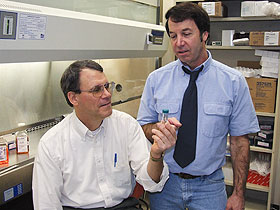  |
| HOME | THIS ISSUE | CALENDAR | GRANTS | BACK ISSUES | < BACK | NEXT > |
Health Center study finds common bacteria may trigger MS by Carolyn Pennington - October 14, 2008 | ||||
| Health Center researchers have found common bacteria that live in almost all of us may trigger multiple sclerosis, a disease in which the body’s immune system attacks the brain and spinal column. The findings suggest that someday autoimmune diseases such as MS, lupus, rheumatoid arthritis, and inflammatory bowel disease, might be treatable by altering the bacterial balance in the mouth, intestines, or vaginal tract. Dr. Robert Clark, associate professor of immunology, and Dr. Frank Nichols, professor of periodontology, have found that these benign bacteria produce lipid compounds that cause the immune system to over-react in a mouse model of human multiple sclerosis called experimental autoimmune encephalomyelitis (EAE). For the most part, these internal invaders have been overlooked as a possible culprit. Scientists have instead zeroed in on foreign invaders, disease-causing bacteria, or viruses, that might tip the ordinarily delicate immune system into over-reacting and attacking the body’s own tissues in autoimmune disease, but the findings of these studies have been inconclusive. “Our research is different,” says Nichols . “We’re focusing not on disease-causing bacteria invading the body from the outside but rather on the ubiquitous bacteria that maintain long-term residence in our human tissues.” Earlier studies by Nichols looked at bacteria that reside in the mouths of most adults. He determined that specific lipid compounds produced by these resident bacteria can be found in areas of blocked and inflamed arteries in humans, suggesting a link between the bacteria and the process of inflammation.
These findings prompted the current research with Clark – trying to show a direct connection with an autoimmune disease such as MS. Specifically, the researchers found that the lipid compound known as phosphoethanolamine dihydroceramide (PEDHC) stimulates receptors in dendritic cells, the vanguard of the immune system that initiates attacks against hostile organisms. “It now appears that dendritic cells may sometimes incorrectly interpret the presence of PEDHC as evidence of a disease-causing infection,” says Nichols. “The dendritic cells then mistakenly mount an attack on surrounding tissues. Among the cells they summon are T-cells, which cause most of the damage to myelin sheaths surrounding nerves in MS.” Clark and Nichols are also evaluating human tissue, looking for direct evidence that the lipid compounds produced by the resident bacteria play a role in MS. “The significance of these studies,” says Clark, “lies in their potential not only to identify a new mechanism for how autoimmune diseases are initiated and/or exacerbated but also to help develop new therapeutic interventions for autoimmune diseases.” |
| ADVANCE HOME UCONN HOME |

